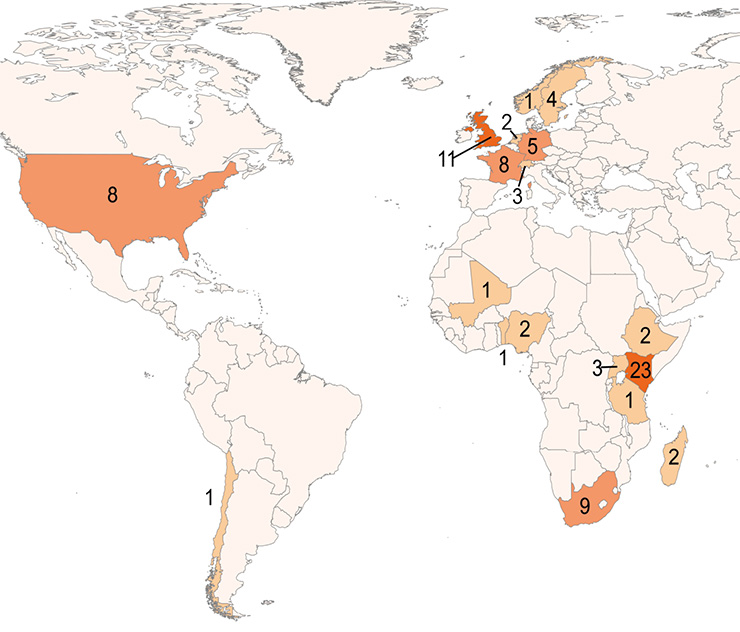- Home
- Publications
- PAGES Magazine
- The African Quaternary: Environments, Ecology and Humans
The African Quaternary: environments, ecology and humans
Brian M. Chase
Past Global Changes Magazine
26(2)
83
2018
Brian M. Chase
Nairobi, Kenya, 14-22 July 2018
With support from PAGES and INQUA, the 2nd AFQUA Conference (The African Quaternary: environments, ecology and humans) took place in Nairobi at the National Museum of Kenya. AFQUA was conceived to bridge the existing gap between large international meetings (>500 delegates) and regional African conferences (~50 delegates) and create a forum to share results and foster communication and collaboration at both regional, continental, and international scales. Further, AFQUA recognizes that the global distribution of research and educational funds favors developed-world researchers to become the recognized leaders in African Quaternary studies, but often their interactions with the local scientific communities are limited to their direct collaborators. AFQUA therefore seeks to (1) create a more fully integrated African research network and (2) provide opportunities for African researchers to develop, access, and share capacity that will allow for their participation in research projects at the highest level. AFQUA brings developed- and developing-world researchers together, but it also goes beyond the standard structure of most conferences, with equal time being dedicated to a series of focus groups and training workshops. These include thematic discussions on cutting-edge research topics as well as workshops that introduce and train researchers in the skills they need to develop and communicate their science in the modern research environment.
 |
|
Figure 1: Distribution of delegates attending the 2018 AFQUA conference in Nairobi, Kenya. |
In Nairobi, 84 researchers from 21 countries came together to share their work from the Pliocene to the projected future, spanning diverse subjects from human evolution, to climate change and vegetation dynamics, fire ecology, risk management, and the history and impacts of humans on their environments. Linking key conference themes with plenaries and sessions, Andy Cohen kicked off the conference showcasing the role that continental drilling of the large East African lake basins has had on our understanding of Quaternary environments in Africa. Subsequent plenaries included Sharon Nicholson discussing African climate change and appropriate ways to use modern systems to understand past climates; Boris Vannière and Daniele Colombaroli highlighting the past and future work of the PAGES Global Paleofire Working Group and the potential for fire ecology research in Africa; David Nash describing how historical documentary sources can be used to study climate-change history and impacts; and Daniel Olago discussing what climate change means in the African context, and how land and water resources may be impacted.
These presentations served as keystones for daily themes, which included papers on regional phenomena from across the continent, as well as papers presented in focus sessions on (1) Quantitative paleoclimatology, modeling and data-model comparisons; (2) The state-of-the-art and perspectives about fire history, fire ecology and fire-vegetation-climate interactions across tropical biomes; (3) The environmental context for hominin evolution and dispersal; (4) African archaeological landscapes; (5) Applying the Quaternary: the role of the past in supporting the future; (6) Dating and correlation of African archives of environmental change and archaeology; and (7) African paleoecology and archaeology perspectives on land-use transformation: Africa LandUse6k.
The PAGES Early-Career Network organized a splinter meeting that gathered 17 participants. Many African early-career researchers discovered the existence of this new network, recognized its potential and expressed a high level of interest to become active members in the future.
Following the five days of presentations, three days of workshops were held to provide training and foster collaboration on research projects. Participants had the opportunity to engage in international drilling programs, improve their knowledge of using lake sediments, animal remains and charcoal to understand paleosystems, learn how to integrate GIS methods in their work, and how to best apply radiocarbon techniques to create reliable chronologies (including the award of five free radiocarbon ages from the 14Chrono Centre to one lucky participant!).
Building on the success of this meeting and the inaugural AFQUA conference held in Cape Town in 2015, we intend to hold the 3rd AFQUA Conference in 2021. If you would like to be added to the AFQUA mailing list, to stay informed about future developments and meetings, please write to us at afqua.congress gmail.com.
gmail.com.
affiliation
Institut des Sciences de l'Evolution-Montpellier, Université de Montpellier, France
contact
Brian M. Chase: Brian.Chase um2.fr
um2.fr